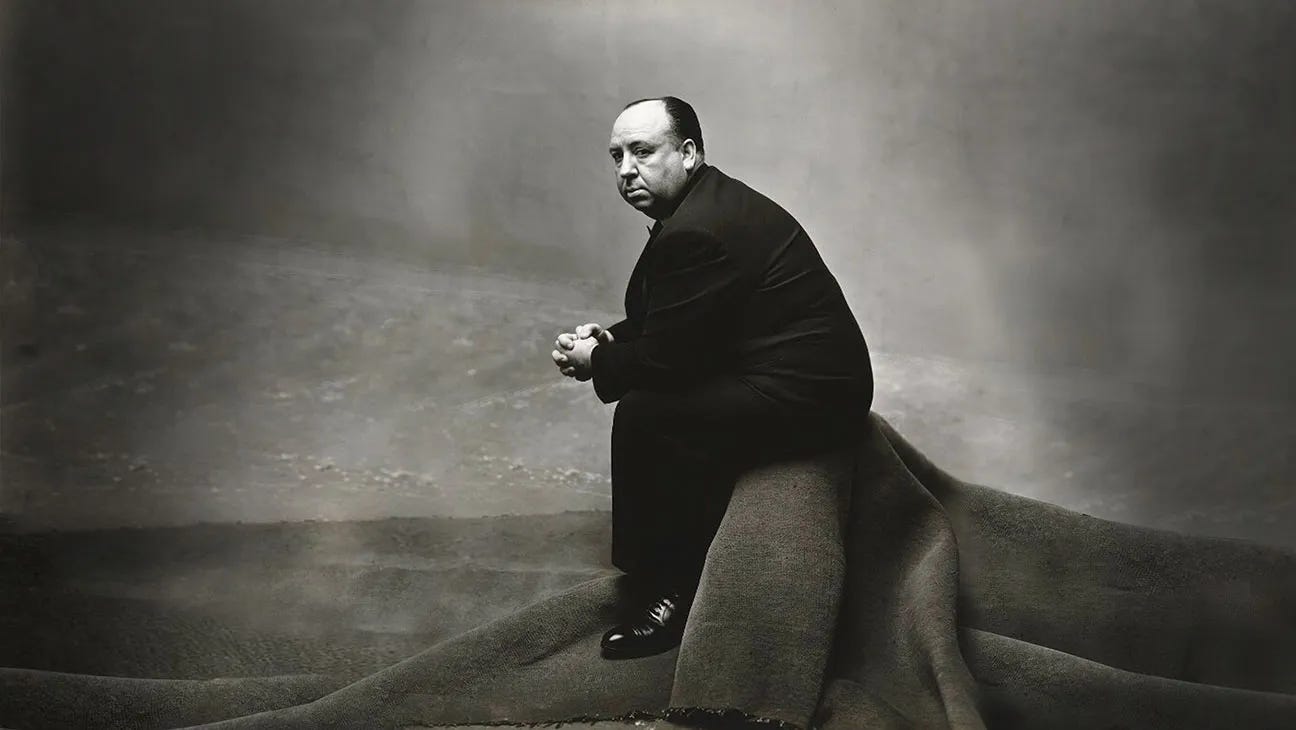My Name is Alfred Hitchcock
The voice of the great filmmaker takes you on a personal tour of his filmography in his own words -- or, at least, very much like something like it in this superlative 'fictional documentary.'
If you’re a fan of Alfred Hitchcock, you’ve simply got to see the new film portrait, “My Name is Alfred Hitchcock.” If you’re not a fan of Hitch, you will be after watching it.
Written and directed by Mark Cousins, it’s purportedly narrated by Hitchcock himself — which would be pretty impressive, considering he died 44 years ago. And it proposes to be him discoursing on his own filmography, taking the audience by the hand on a personal journey through his 50 years of making movies.
It’s not the actual man, of course; though we only learn this for certain during the end credits. Noted impressionist Alistair McGowan does a spot-on imitation of Hitchcock, right down to the sinus-y pauses for breath. I swear you can actually hear the famous jowls flapping.
I’m not sure even what to label this movie. I guess you’d call it a documentary, but all the words are made up. It’s a fictional treatise on Hitchcock that feels like it could have come out of his own mouth.
Through clips of all of his major films and even a good chunk of the ones most people haven’t seen — starting in the silent era — it’s a virtual master class on his cinematic techniques, from his disdain for long dialogue sequences to his use of height, narrow spaces and a shadows to push the themes of his story and characters.
Let me put it this way: I took a class at New York University on Alfred Hitchcock, taught by a professor who literally ‘wrote the book’ on him, aka had what was considered at the time one of the key scholarly texts on the subject. I felt like I learned more about Hitch in two hours of watching this movie than that whole semester.
The film is divided into five sections, each with their own theme about his filmmaking aesthetic. There’s no temporal continuity, so we might see a clip from 1960’s “Psycho” and then jump back to his 1925 debut, “The Pleasure Garden.” What’s striking is the continuity between his works, so we can see the same techniques used over and over again.
The first section, Escape, looks at the common impulse among his thrillers: the need for the characters to escape from a terrible situation, such as being wrongly accused of a crime. The next part, Desire, is in some ways the inverse of the first, showing the way people desire something, whether it’s sex, status or a physical object.
In Loneliness, we see time and again the use of a camera high up on a crane to show a character’s isolation, or walking behind them down a darkened hallway.
The section, Time, is probably my favorite, and demonstrates the proper use of pacing in a film — something I think, along with tone, is the hardest aspect of movie-making to master. “When your character wants time to speed up, slow it down,” Hitchcock intones, demonstrating a moment of high peril where the character is repeatedly delayed and confounded.
The last part, Fulfillment, might at first blush seem similar to Desire. But really it’s about the moment a characters attains, however briefly, the things they wanted and get a moment to to revel in that satisfaction. But fulfillment can also been painful, such as when someone reaches their goal and finds that it was a misguided one. There’s also a bit of Hitchcock’s personal life here, including his long partnership with his wife, Alma, who was known to read and approve every screenplay.
“All movies lie,” Hitchcock tells us — including this movie. He challenges us at the beginning that he will tell us one lie, and it’s up to us to puzzle out where it is. (I failed the test.) When he talks about lying, what he means is that all films manipulate their audience in some way, especially their emotions and expectations.
I learned a lot about Hitchcock’s various camera techniques, such as his tendency to circle a pair of lovers caught in an embrace. (Curiously, probably the most famous example of this, from “Vertigo,” is not shown.)
In Hitchcock’s mind, the camera is his personal eye, roving where he wants it to go, revealing what he wants to reveal and obscuring that which he does not. He refers to it as a sort of omniscience, the god-like power to see all. Left unsaid by Hitchcock himself was his authoritarian bent, as he was known to be quite demanding, even cruel on sets — especially of his leading ladies.
But you can’t expect Hitchcock himself, or at least his cinematic avatar, to illuminate his own foibles. “My Name is Alfred Hitchcock” is an act of ego, a great man telling you about his greatness. The fact it’s all made up only seems to give it more of a sense of authenticity.






What a captivating and insightful review! Your deep dive into My Name is Alfred Hitchcock brilliantly captures the film's essence and unique structure. I love how you highlight the blend of documentary and fiction, making it accessible for both longtime fans of Hitchcock and newcomers alike. Your personal connection to the subject, especially your NYU class experience, adds a rich layer to your perspective. The way you articulate the film's exploration of themes like Escape, Desire, and Loneliness is particularly striking. It makes me eager to watch this film and experience the cinematic journey you’ve so vividly described!
Wonderful review-thank you.
Mark Cousins is a genius. I saw his « The First Movie » years ago. It seemed then, and now, that I’d seen something very rare and original. It was deeply heartfelt and intellectually stimulating. I can’t wait to see this new film.